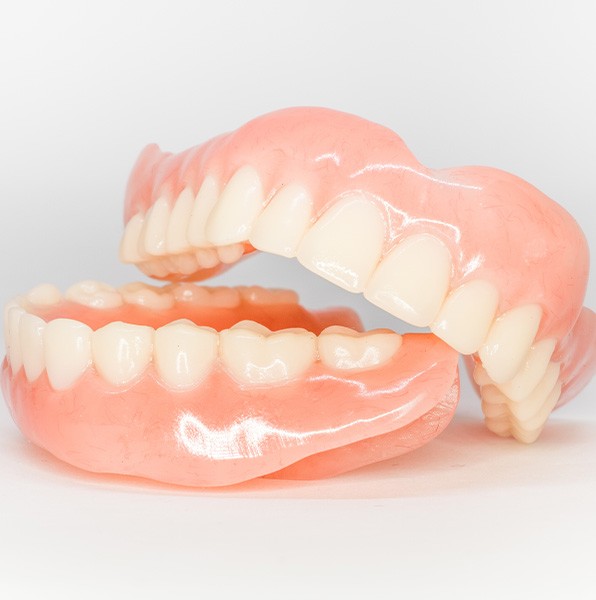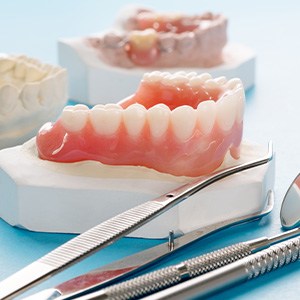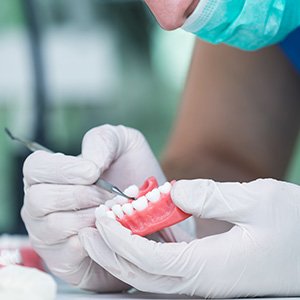Dentures – Jacksonville, FL
An Affordable Tooth Replacement Option
Tooth loss is very common, and it affects millions of Americans throughout the country. Fortunately, just because you have lost teeth doesn’t mean that you need to go the rest of your life with gaps in your smile. At Distinctive Dentistry, Dr. Richard C. Mullens and Dr. James Nguyen offer high-quality dentures as an affordable tooth replacement option. To learn more about dentures in Jacksonville, give us a call ! We’d be happy to answer your questions and schedule you for your initial consultation.
Why Choose Distinctive Dentistry for Dentures?
- Dentists Involved in Professional Dental Organizations
- Made from High-Quality, Natural-Looking Materials
- Dental Insurance Accepted & Flexible Financing Options Available
Who’s a Good Candidate for Dentures?

Dentures are an excellent tooth replacement option for people who are missing several, most of, or all of their teeth. Tooth loss can make it difficult to complete daily tasks, like eating, speaking, and smiling. Depending on the number and location of missing teeth, a personalized plan can be created to restore your smile. However, if you have preexisting oral health issues, like tooth decay or periodontal disease, they will need to be treated and eliminated beforehand. When it comes to restoring your smile, your oral health maintains the number one priority of the dental team.
Effects of Missing Teeth

According to the American College of Prosthodontists, the common causes of missing teeth include cavities, periodontal disease, and trauma. When you have suffered from tooth loss, you can expect many negative consequences, like facial sagging, difficulty speaking, trouble eating, and a reduction in your self-esteem. These can all take a toll on your quality of life.
What Qualifies You for Dentures?
If you have lost multiple or all of your teeth, have extreme tooth sensitivity, or endured lots of decay, dentures could be the life-changing tooth replacement option you’ve been hoping for! To get dentures, it is important that you have sufficient, healthy gum tissue and jawbone. You must also be committed to maintaining an excellent oral hygiene routine.
Alternative Tooth-Replacement Options

If you don’t make a good candidate for dentures, another tooth replacement option may be better suited to meet your needs:
- Dental Bridges: Dental bridges are an excellent option for patients who have only lost one or a few teeth. They require that you have healthy teeth surrounding the gap to properly support the bridge.
- Dental Implants: With this procedure, a titanium post is surgically inserted into the jawbone to anchor your replacement tooth into place. This means that you need to have a solid bone structure. This option costs more than dental bridges and dentures, but it is a permanent tooth replacement option.
Types of Dentures

You will get one of three types of dentures if you are deemed a good candidate for the restoration. Here are the different options:
Partial Dentures
When a dental bridge isn’t quite enough for restoring your smile, a partial denture may be a viable option. This type of denture is customized to fit perfectly between your remaining healthy teeth to fill in gaps. Partial dentures can replace teeth in different places of the mouth and keep neighboring teeth from moving around and causing misalignment issues in the future.
Full Dentures
Full dentures are supported by both the shape of your mouth and natural suction of the gum tissue. They’re used to replace an entire arch of missing teeth, either on the top or bottom. They are crafted with a lifelike gum-colored base and enamel-colored set of replacement teeth. This way, your new smile will appear uniform and natural.
Implant Dentures
For a more stable, longer-lasting denture, dental implant dentures are available. First, a series of dental implants are placed throughout the jawbone before attaching the customized restoration. This type of denture can restore up to 70% of your natural chewing function, and it’s designed to last for decades without the need for alterations and replacements. To make a good candidate for dental implant dentures, you need to have a strong jawbone to support them. This will all be discussed during your initial consultation.
How Dentures are Made

Many patients who want to replace their missing teeth struggle with choosing the right restoration to meet their needs. Our team believes that learning how dentures are made can help you better appreciate these versatile prosthetics. They’re tailored at each stage of creation to fit like a glove and look just like your natural teeth and gums. As a result, they can restore your smile’s functionality and appearance simultaneously.
Read on to dive into the details of creating your new dentures, and feel free to contact us for more information.
What are Dentures Made Of?

Dentures contain two main parts: the base and the pontics (artificial teeth). Each component is described in more depth below:
- Denture base. This portion is what gives your prosthetics the support they need to retain their shape. It can be made from several materials such as acrylic, nylon, porcelain, composite resin, or metal. Usually, full dentures utilize an acrylic base because it can be individualized to look like your gum tissue. Partial dentures frequently contain metal clips in conjunction with acrylic to anchor to healthy teeth in your mouth.
- These typically are built out of porcelain or resin because both materials reflect light like enamel and can be color-matched to your natural teeth. However, ceramic is the standard because it looks and feels so lifelike. It can be abrasive against remaining teeth in your mouth, so is often recommended for full dentures.
The Denture Creation Process

It might vary slightly depending on your unique circumstances, but usually, creating your restoration requires the following step-by-step process:
- Step 1: At your consultation appointment, our team will make digital impressions of your upper and lower teeth and gums using state-of-the-art technology. This builds a virtual model of your mouth that can be shared with a special dental laboratory to design your dentures.
- Step 2: After receiving all the necessary images and information, a technician will build a cast of your jaw and create a wax version of the gumline.
- Step 3: Pontics are set into place using a device known as an articulator. Then, the tech shapes and carves the wax to give it a more natural appearance.
- Step 4: The wax dentures are returned to us so we can schedule you for a fitting. If everything checks out, we’ll send them back to be finalized.
- Step 5: Back at the lab, a tech places this model into a flask filled with plaster to maintain the shape of your modeled dentures. Next, this container is placed in hot water to melt away the wax portions.
- Step 6: Holes are made in the pontics so they attach appropriately, and a liquid separator is added into the plaster to keep acrylic from sticking to it. Then, acrylic is injected into the flask to replace the wax.
- Step 7: The plaster is carefully chipped away using special instruments, revealing the restoration inside. Then, your dentures are placed in a sonic bath to remove any remaining residue.
- Step 8: Excess acrylic is trimmed away, and your new prosthetics are polished to perfection.
- Step 9: The lab returns your completed restoration to us so we can schedule your final fitting.
Adjusting to Your New Dentures

It’s natural to feel some discomfort until your mouth acclimates to supporting your dentures, which can often take about a month. In that time, you might notice that you develop a lisp or other challenges trying to enunciate words. You might also struggle to chew with them until your tongue and other supporting muscles learn to work around them.
To ease your transition, you might start off by sticking to soft foods that are easier to bite into. You can also practice difficult words or sounds until you can communicate as clearly as ever. If you have persistent pain or sores that have become infected, please let us know so we can schedule a time for you to come in.
The Benefits of Dentures

You can expect all sorts of benefits by opting for dentures as a tooth replacement option. Not only are they lifelike and complete your bite, but they can also provide a positive impact on your oral health and overall well-being. Read on to learn about the various advantages you’ll be able to enjoy once you restore your smile with dentures.
Psychological Benefits

Missing just one of your pearly whites can lead to various psychological downsides. Most people struggling with tooth loss end up feeling self-conscious about their appearance and might refrain from participating in social events altogether. By renewing your bite with dentures, you’ll be free to show off a grin that you’re proud of, which can also help significantly reduce any anxiety about your speech, chewing ability, appearance, and more.
Clearer Enunciation

In order to speak most clearly, we typically press our tongue and lips against our teeth to enunciate certain sounds and words. However, missing some of them can make it difficult for us to pronounce our sentences properly. Fortunately, you can easily replace lost teeth with dentures, allowing you to enjoy a complete grin as well as providing you the necessary structure for speaking clearly again! It can take some time to get used to your prosthetics, but a little practice can make this process smoother.
Improves Nutrition

By wearing dentures, you can effectively restore a large majority of your natural chewing power. This means you’ll be free to expand your dietary choices, including nutritional foods like fruits, veggies, low-fat dairy, and lean proteins. Being unable to properly chew your meals can end up increasing the risk of indigestion and malnutrition, which can affect both your oral and overall health. This makes dentures an incredibly beneficial treatment for your bodily well-being.
Preserves Oral Health

Any remaining natural teeth that you have will start to shift out of place to fill in any gaps left from tooth loss. Dentures, however, can serve as placeholders and prevent dental shifting for years to come. Additionally, with a more even bite, you can reduce the risk of wearing down your natural enamel due to the pressures of chewing.
Expands Opportunities

Once you’ve regained a full bite, you can be sure to feel more comfortable showing off your new pearly whites. Since your smile is one of the first things people will notice about you, it’s important to be able to present a full grin. Not only will you feel more confident, but others will also perceive you as more outgoing, competent, and attractive—expanding your social and professional opportunities in the long run!
Understanding the Cost of Dentures

Are you ready to say goodbye to the gaps in your smile? Before getting dentures in Jacksonville, you likely want to know how much it’ll cost. Since every case is unique, the price can vary significantly from patient to patient. Rest assured – our team at Distinctive Dentistry will thoroughly explain the pricing information during your consultation to ensure you experience no surprises throughout the process. Not only will you have a better understanding of your expected costs, but you’ll get an idea of what your future smile will look like.
Factors that Affect the Cost of Dentures

When calculating the total cost of dentures in Jacksonville, there are many factors you must take into consideration. A few major elements that influence the overall price include:
- Any preliminary dental work you need (i.e., tooth extractions or periodontal therapy)
- Number of teeth you’re missing
- Type of acrylic used for the base, which is what’s dyed to match the color of your gum tissue
- Materials your replacement teeth will be made of (usually porcelain or acrylic)
If you’re on a budget, you may be tempted to opt for a cheaper denture. However, that’s not recommended. More affordable oral appliances tend to break easily and will need a replacement much sooner than anticipated. For that reason, it’s always best to invest in high-quality and durable dental work.
Are Implant Dentures More Expensive?

Yes, mainly because they require oral surgery and the placement of multiple dental implants. Most patients find implant dentures to be worth every penny because they’re far more reliable for day-to-day use. Since implants are firmly rooted into the jawbone, they’ll stay in place while in use. Plus, they help stimulate the jawbone to provide you with increased biting strength and longevity. With proper care and maintenance, you can expect your fully functioning grin to last several decades!
Does Dental Insurance Cover Dentures?

You’ll be happy to know that most dental insurance plans cover around 50% of the costs associated with dentures. Of course, every policy is unique, meaning the exact level of coverage can vary significantly from person to person. Before committing to anything, you should confirm the details of your plan with your insurance provider. If needed, our team can help with that step and maximize your benefits.
Other Options for Making Dentures Affordable

We understand that some people may not have dental insurance, or their plan doesn’t cover as much of the costs as they thought it would. Fortunately, we offer other solutions to make your care as affordable as possible. At Distinctive Dentistry, you can apply for third-party financing through CareCredit. It allows you to split up the total cost of your care into smaller monthly installments. With this option, you can make even the most expensive dental treatment fit your budget!
Ultimately, the best way to get an accurate cost estimate is by attending a consultation with our team. We’ll happily address any concerns you have and do what we can to keep your out-of-pocket expenses as low as possible.
Denture FAQs

If you have missing teeth, you know from experience how much it can affect your overall quality of life. Luckily, dentures can help you enjoy a complete and fully functioning smile once again! Of course, we understand that you may have a few concerns before making a final decision to rebuild your grin. At Distinctive Dentistry, we want to be as helpful as possible throughout this process, which is why we’ve decided to answer some frequently asked questions below. If you’d speak directly with a member of our team, feel free to give us a call today!
How Long Will You Have to Wait to Get Dentures After Your Teeth Are Pulled?
Generally, most patients have to wait about six to eight weeks after their teeth are pulled to receive dentures in Jacksonville. While two months may seem like a long time, it’s necessary to ensure the gums have an opportunity to heal properly. It’s also worth noting that the exact amount of time needed will depend on your unique case.
If you’re getting immediate dentures, they can be placed on the same day as an extraction. However, you may need to get a replacement much sooner than anticipated because the shape of the jawbone will change as your mouth heals. For those getting implant dentures, you’ll need to wait about four to six months for the implant to fuse with the jawbone via a natural process called osseointegration.
Can I Sleep with My Dentures?
When you first get dentures in Jacksonville, you’ll be asked to keep them in your mouth for 24 hours, including sleep. After that, it’s strongly recommended that you remove them every night before bed. It will give your gum tissue and jawbone a chance to rest after supporting your oral appliances all day. Also, sleeping with dentures has been found to be associated with poor oral hygiene and a higher risk of pneumonia.
Will It Hurt to Get Dentures?
If you need to undergo oral surgery before getting dentures, you’ll likely experience some discomfort after your procedure. The good news is that you can easily manage these side effects by taking over-the-counter pain medication and rinsing with warm saltwater.
When you first get your dentures, your mouth will feel slightly irritated and sensitive while it adjusts to your new smile. Although it can take a few months for the discomfort to go away, the exact amount of time will vary from person to person. If your discomfort worsens, don’t hesitate to give us a call.
What Can’t You Eat with Dentures?
It’s incredibly important to be mindful of the foods you eat to keep your smile free of harm. You should avoid sticky foods like peanut butter and gummy candies because they can pull your dentures out of place. Plus, it makes it easier for food particles to get trapped underneath the oral appliances, causing gum irritation. It’s also a good idea to avoid foods like popcorn, shelled nuts, apples, corn on the cob, and tough meats because they can damage or dislodge your dentures.
